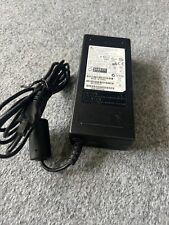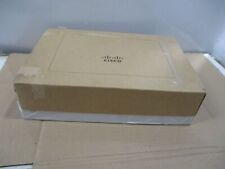Cisco AIR-CT2504-K9 75 APs License Wireless Controller AIR-CT2504-75-K9 For Sale

When you click on links to various merchants on this site and make a purchase, this can result in this site earning a commission. Affiliate programs and affiliations include, but are not limited to, the eBay Partner Network.
Cisco AIR-CT2504-K9 75 APs License Wireless Controller AIR-CT2504-75-K9:
$799.99
CiscoAIR-CT2504-75-K92500 Wireless LAN Controller75 Access Points License+
Power adapter
Product Overview
The Cisco®2500 SeriesWireless Controllerenables systemwidewirelessfunctions in small to medium-sized enterprises and branch offices. Designed for802.11n and 802.11acperformance, Cisco 2500 Series Wireless Controllers are entry-level controllers that provide real-time communications betweenCisco Aironet®access pointsto simplify the deployment and operation of wireless networks (Figure 1).
Figure 1.Cisco 2500 Series Wireless Controller
As a component of theCisco Unified Wireless Network, this controller delivers centralized security policies, wireless intrusion prevention system (wIPS) capabilities, award-winning RF management, and quality of service (QoS) for voice and video. Delivering 802.11ac performance and scalability, the Cisco 2500 Series provides low total cost of ownership and flexibility to scale as network requirements grow.
The Cisco 2504 Wireless Controller supports Cisco Application Visibility and Control (AVC), the technology that includes Cisco’s Network-Based Application Recognition 2 (NBAR-2) engine. N-BAR-2 does deep packet inspection (DPI) to classify applications and tie into quality of service (QoS) to either drop or mark the traffic, thereby prioritizing business-critical applications in the network. Cisco AVC uses NetFlow Version 9 to export the flows toCisco Prime™Infrastructureor a third-party NetFlow Collector. The Cisco 2504 Wireless Controller also supports Bonjour Services Directory, which enables Bonjour (Apple) Services to be advertised and utilized in a separate Layer 3 network. Wireless Policy engine is a wireless profiler and policy featureon the Cisco 2500 Series Wireless Controllerthat enables profiling of wireless devices and enforcement of policies such as VLAN assignment, QoS, ACL, and time-of-day-based access.
Cisco 2500 Series Wireless Controller-basedaccess pointlicensing offers flexibility with 5, 15, 25, or 50access points. Additional access point support can be added in increments of 1, 5, or 25.
Table 1 lists the features and benefits of the Cisco 2500 Series Wireless Controllers.
Table 1.Cisco 2500 Series Wireless Controller Features and Benefits
Feature
Benefits
Scalability
●Supports up to 75access points●Supports up to 1000 clientsEase of Deployment
●For quick and easy deployment Access Points can be connected directly to 2504 Wireless LAN Controller via two PoE (Power over Ethernet) portsHigh Performance
●Wired-network speed and nonblocking performance for 802.11n and 802.11ac networks. Supports up to 1 Gbps throughputRF Management
●Provides both real-time and historical information about RF interference impacting network performance across controllers, via systemwideCisco CleanAir®technologyintegrationComprehensive End-to-End Security
●Offers CAPWAP-compliant Datagram Transport Layer Security (DTLS) encryption to help ensure full-line-rate encryption between access points and controllers across remote WAN/LAN linksEnd-to-end Voice
●Supports Unified Communicationsfor improved collaboration through messaging, presence, and conferencing●Supports all Cisco Unified Wireless IP Phonesfor cost-effective, real-time voice servicesHigh-Performance Video
●Integrates Cisco VideoStream technology as part of the Cisco medianet framework to optimize the delivery of video applications across the WLANPCI Integration
●Part of Payment Card Industry (PCI) certified architecture, and are well-suited for retail customers who deploy transactional data applications such as scanners and kiosksOfficeExtend
●Supports corporate wireless service for mobile and remote workers with secure wired tunnels to the Cisco Aironet®600, 1130, 1140 or 3500 Series Access Points●Extends the corporate network to remote locations with minimal setup and maintenance requirements●Improves productivity and collaboration at remote site locations●Separate service set identifier (SSID) tunnels allow both corporate and personal Internet access●Reduced carbon dioxide emissions from a decrease in commuting●Higher employee job satisfaction from ability to work at home●Improves business resiliency by providing continuous, secure connectivity in the event of disasters, pandemics, or inclement weatherEnterpriseWireless Mesh
●Allows access points to dynamically establish wireless connections without the need for a physical connection to the wired network●Available on select Cisco Aironet access points, Enterprise Wireless Mesh is ideal for warehouses, manufacturing floors, shopping centers, and any other location where extending a wired connection may prove difficult or aesthetically unappealingEnvironmentally Responsible
●Organizations may choose to turn off access point radios to reduce power consumption during off-peak hoursMobility, Security and Management for IPv6 & Dual-Stack Clients
●Secure, reliable wireless connectivity and consistent end-user experience●Increased network availability by proactive blocking of known threats●Equips administrators for IPv6 troubleshooting, planning, client traceability from a common wired and wireless management systemGuest Anchor and Wired Guest Access
●Supports up to 15 guest anchor Ethernet over IP (EoIP) tunnels forpath isolation of guest traffic from enterprise data traffic●Extends the guest access services to the wired clients on par with other WLAN ControllersProduct Specifications
Table 2 lists the product specification for Cisco 2500 Series Wireless Controllers.
Table 2.Product Specifications for the Cisco 2500 Wireless Controller
Item
Specification
Wireless Standards
IEEE 802.11a, 802.11ac, 802.11b, 802.11g, 802.11d, WMM/802.11e, 802.11h, 802.11k, 802.11n, 802.11r, 802.11u, 802.11w, 802.11ac
IEEE 802.3 10BASE-T, IEEE 802.3u 100BASE-TX specification, 1000BASE-T, and IEEE 802.1Q VLAN tagging
Data Request for Comments (RFCs)
●RFC 768 UDP●RFC 791 IP●RFC 2460 IPv6 (passthrough bridging mode only)●RFC 792 ICMP●RFC 793 TCP●RFC 826 ARP●RFC 1122 Requirements for Internet Hosts●RFC 1519 CIDR●RFC 1542 BOOTP●RFC 2131 DHCP●RFC 5415 CAPWAP Protocol SpecificationSecurity Standards
●Wi-Fi Protected Access (WPA)●IEEE 802.11i (WPA2, RSN)●RFC 1321 MD5 Message-Digest Algorithm●RFC 1851 The ESP Triple DES Transform●RFC 2104 HMAC: Keyed Hashing for Message Authentication●RFC 2246 TLS Protocol Version 1.0●RFC 2401 Security Architecture for the Internet Protocol●RFC 2403 HMAC-MD5-96 within ESP and AH●RFC 2404 HMAC-SHA-1-96 within ESP and AH●RFC 2405 ESP DES-CBC Cipher Algorithm with Explicit IV●RFC 2406 IP Encapsulating Security Payload (ESP)●RFC 2407 Interpretation for ISAKMP●RFC 2408 ISAKMP●RFC 2409 IKE●RFC 2451 ESP CBC-Mode Cipher Algorithms●RFC 3280 Internet X.509 PKI Certificate and CRL Profile●RFC 3602 The AES-CBC Cipher Algorithm and Its Use with IPsec●RFC 3686 Using AES Counter Mode with IPsec ESP●RFC 4347 Datagram Transport Layer Security●RFC 4346 TLS Protocol Version 1.1Encryption
●WEP and Temporal Key Integrity Protocol-Message Integrity Check (TKIP-MIC): RC4 40, 104 and 128 bits (both static and shared keys)●Advanced Encryption Standard (AES): CBC, CCM, Counter Mode with Cipher Block Chaining Message Authentication Code Protocol (CCMP)●DES: DES-CBC, 3DES●Secure Sockets Layer (SSL) and Transport Layer Security (TLS): RC4 128-bit and RSA 1024- and 2048-bit●DTLS: AES-CBCAuthentication, Authorization, and Accounting (AAA)
●IEEE 802.1X●RFC 2548 Microsoft Vendor-Specific RADIUS Attributes●RFC 2716 PPP EAP-TLS●RFC 2865 RADIUS Authentication●RFC 2866 RADIUS Accounting●RFC 2867 RADIUS Tunnel Accounting●RFC 3576 Dynamic Authorization Extensions to RADIUS●RFC 3579 RADIUS Support for EAP●RFC 3580 IEEE 802.1X RADIUS Guidelines●RFC 3748 Extensible Authentication Protocol●Web-based authentication●TACACS support for management usersManagement
SNMP v1, v2c, v3
RFC 854 Telnet
RFC 1155 Management Information for TCP/IP-Based Internets
RFC 1156 MIB
RFC 1157 SNMP
RFC 1213 SNMP MIB II
RFC 1350 TFTP
RFC 1643 Ethernet MIB
RFC 2030 SNTP
RFC 2616 HTTP
RFC 2665 Ethernet-Like Interface types MIB
RFC 2674 Definitions of Managed Objects for Bridges with Traffic Classes, Multicast Filtering, and Virtual Extensions
RFC 2819 RMON MIB
RFC 2863 Interfaces Group MIB
RFC 3164 Syslog
RFC 3414 User-Based Security Model (USM) for SNMPv3
RFC 3418 MIB for SNMP
RFC 3636 Definitions of Managed Objects for IEEE 802.3 MAUs
Cisco private MIBs
Management Interfaces
●Designed for use with Cisco Wireless Control System●Web-based: HTTP/HTTPS individual device manager●Command-line interface: Telnet, SSH, serial portInterfaces and Indicators
●Console port: RJ-45 connector●Network: Four 1 Gbps Ethernet (RJ-45)●LED indicators: Link Activity (each 1 Gigabit Ethernet port), Power, Status, AlarmPhysical and Environmental
Dimensions: 1.73 x 8.00 x 6.75 in. (43.9 x 203.2 x 271.5mm)
Weight: 3.5 lbs (with power supply)
Humidity:
●Operating humidity: 10 to 95 percent, noncondensing●Storage humidity: Up to 95 percentPower adapter: Input power: 100 to 240 VAC; 50/60 Hz
Heat dissipation: 72 BTU/hour
Regulatory Compliance
Safety:
●UL 60950-1, 2ndEdition●EN 60950:2005EMI and susceptibility (Class B):
●U.S.: FCC Part 15.107 and 15.109●Canada: ICES-003●Japan: VCCI●Europe: EN 55022, EN 55024
Related Items:
Cisco PWR-80W-AC PWR-2504-AC for AIR-CT2504-K9 Wireless Controller Power Supply
$19.99
Cisco 2500 Controller AIR-CT2504-25-K9 2504 Wireless Controller with 25 AP Licen
$400.00
![]()
Documentation
- AIX Local Security Checks
- Backdoors
- CentOS Local Security Checks
- CGI abuses
- CISCO
- Databases
- Debian Local Security Checks
- Default Unix Accounts
- Denial of Service
- Fedora Local Security Checks
- Finger abuses
- Firewalls
- FreeBSD Local Security Checks

